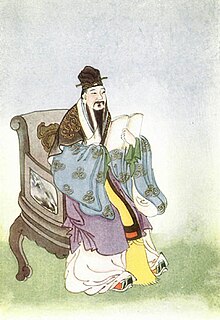Mencius
| Mencius |
|
|---|---|

Mencius, from Myths and Legends of China, 1922 by E. T. C. Werner
|
|
| Born | 372 BC |
| Died | 289 BC (aged 83) |
| Era | Ancient philosophy |
| Region | Chinese philosophy |
| School | Confucianism |
|
Main interests
|
Ethics, Social philosophy, Political philosophy |
|
Notable ideas
|
Confucianism |
|
Influences
|
|
|
Influenced
|
|
| Mencius | |||||||||||||||||||||||||||||||
| Chinese | 孟子 | ||||||||||||||||||||||||||||||
|---|---|---|---|---|---|---|---|---|---|---|---|---|---|---|---|---|---|---|---|---|---|---|---|---|---|---|---|---|---|---|---|
| Literal meaning | "Master Meng" | ||||||||||||||||||||||||||||||
|
|||||||||||||||||||||||||||||||
| Transcriptions | |
|---|---|
| Standard Mandarin | |
| Hanyu Pinyin | Mèngzǐ |
| Gwoyeu Romatzyh | Menqtzyy |
| Wade–Giles | Meng4-tzu3 |
| IPA | [mə̂ŋtsɨ̀] |
| Yue: Cantonese | |
| Yale Romanization | Maahng-jí |
| Jyutping | Maang6-zi2 |
| Southern Min | |
| Tâi-lô | Bīng-tzú |
| Middle Chinese | |
| Middle Chinese | Mæ̀ng-tzí |
| Old Chinese | |
| Baxter-Sagart | *mˤrang-s tsəʔ |
| Ancestral name (姓): | Ji (Chinese: 姬; Pinyin: Jī) |
| Clan name (氏): | Meng (Ch: 孟; Py: Mèng) |
| Given name (名): | Ke (Ch: 軻; Py: Kē) |
| Courtesy name (字): | Unknown |
| Posthumous name (謚): | Master Meng the Second Sage (Ch: 亞聖孟子; Py: Yàshèng Mèngzǐ) |
| Styled: | Master Meng (Ch: ; Py: Mèngzǐ) |
Mencius (/ˈmɛnʃiəs/) or Mengzi (Chinese: ; 372 – 289 BC; alt. 385 – 303/302 BC) was a Chinese philosopher who is the most famous Confucian after Confucius himself.
Mencius, also known by his birth name Meng Ke or Meng Ko (孟轲), was born in the State of Zou, now forming the territory of the county-level city of Zoucheng (originally Zouxian), Shandong province, only thirty kilometres (eighteen miles) south of Qufu, Confucius' birthplace.
He was an itinerant Chinese philosopher and sage, and one of the principal interpreters of Confucianism. Supposedly, he was a pupil of Confucius' grandson, Zisi. Like Confucius, according to legend, he travelled throughout China for forty years to offer advice to rulers for reform. During the Warring States period (403–221 BC), Mencius served as an official and scholar at the Jixia Academy in the State of Qi (1046 BC to 221 BC) from 319 to 312 BC. He expressed his filial devotion when he took three years leave of absence from his official duties for Qi to mourn his mother's death. Disappointed at his failure to effect changes in his contemporary world, he retired from public life.
...
Wikipedia
